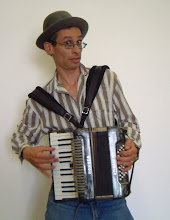* * * * * *
A few weeks ago I wrote an article comparing the quality of
Yiddish in two leading newspapers…the Allgemeiner Journal, and the Vorwärts
(also known as the “Forverts”). The latter paper recently shut down its print
version, but still maintains a vigorous internet presence. I was at the
downtown library today, where they still stock the Allgemeiner Journal, and I
read a few articles.
The lead article was about the release of 26 long-term
Palestinian prisoners, apparently under the prodding of Secretary of State John
Kerry, as part of a good-will gesture to the Palestinian negotiators. What made
this special was that these were identified as prisoners with “blood on their hands”,
which provoked considerable outrage among the Israeli public. I was also
outraged although perhaps only mildly so. My feelings had less to do with the
political issues involved than with the Yiddish word the writer had chosen to
describe the Israeli “public”: he called it the öffentlechkeit. Surely this was a clumsy adaptation derived by
working backwards from the English?
The root of the word is clearly the same as the English
“open”; so the adverb “öffentlech” is
uncontroversial in its meaning of “out in the open”, or more simply “publicly”.
Now, in Yiddish, adverbs are not always so clearly distinguished from
adjectives; so the same word is aguably translateable as the adjective
“public”. (At least Weinreich assigns it double duty; and who am I to argue
with Weinreich?) The question is: does adding the noun ending –keit transform the adjective to the
noun we understand in English as “the public”? I don’t think so.
Yet going down the column of entries, I see that Weinreich
does indeed list die öffentlechkeit
as a noun, and he translates it as “public”. Not the public, just public.Well, I gave him a pass on the adjective,
but now I’m not so sure I want to let him off the hook that easily. So I check
in Harkavey. Sure enough, it’s there, but Harkavey defines it as publicity. That’s quite different. I’m
not sure I find it convincing in its Madison Avenue sense, and perhaps that’s
not what it meant to Harkavey in 1908. I find it more convincing as publicness, as in the “publicness” of
Rob Ford’s disgrace over the tapes. That I’m willing to buy.
But just to make sure, I run a google search on it. There is
a lot of transcribed Yiddish on the internet, especially in places like the
Mendele archives, where you can find authentic Yiddish written by highly literate
speakers. So I typed in “efentlekhkayt”, using the standard YIVO phonetics
espoused by the professor types. Sure enough, I got a hit.
The word appears in the writings of Warsaw Ghetto diarist/historian
Emanuel Ringelblum; writing about the despair of the Ghetto at the failure of
the Poles to bring the Jewish tragedy to the attention of the outside world, he
wrote in 1942:
“We were angry at the Polish community [efentlekhkayt] and at those in contact with the Polish government
because there were no transmissions about the murder of the Polish Jews…”
Surely if Ringelblum used the word to mean “community”, that
is consistent with the use of “public” to which I objected in the Allgemeinter
Journal. Perhaps I was wrong.
Or was I? Just what did Ringelblum mean by that word? He
wrote in Yiddish, not English…the English translation of “community” was
provided by one Samuel Kassow, author of
the book Who Will Write Our History
where the quoted passage appears. What then are Kassow’s credentials as a
translator? And why, in the midst of a long quoted passage translated from
Yiddish, does he single out one word to indicate the Yiddish original? Perhaps
he himself was not so sure of the intended nuance. Even Harkavey’s “publicity”,
in its admittedly dubious Madison-Avenue sense, arguably works just as well in
this passage. Was Ringelblum angry at the Polish public, or at the Polish publicity
which downplayed the Jewish tragedy? It’s not so obvious.
Kassow’s credentials, by the way, check out. He is an
American professor and author of books on Ashekenazi Jewish history, born in a
DP camp in Germany in 1946. So I’m guessing his Yiddish is better than mine. Still,
when it comes to that one word in that one passage…what does he know that I
don’t?
We still haven’t exhausted all avenues of research. In
Yiddish, when in doubt…look to the Kraut. And what a treasure-trove of
information we find when we google Öffentlichkeit
(the Germans of course capitalize their nouns.) It is indeed a word in German,
in fact a highly nuanced concept so intricate that it merits its own lengthy
article in the German Wikipedia.
If my German is to be trusted, then the concept of Öffentlichkeit describes the realm of
social and political discourse, the public arena in which ideas and ideologies
are hammered out and debated. If Ringelblum was using the word in this sense,
then he was deploring the miniscule place the Jewish tragedy occupied in the
general Polish discourse.
I have more to say about this but I think I’ve hit my
900-word limit. So, with Bernie’s permission, we’ll continue this discussion
when we return. Unless he tells me he wants something a bit lighter, which I
must admit is a distinct possibility…

No comments:
Post a Comment